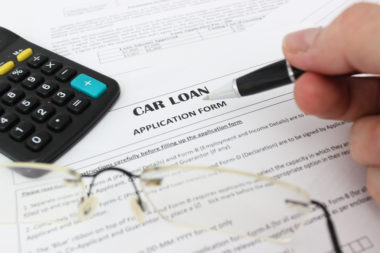There can be many reasons why you might want to refinance your car loan. Maybe the interest rate on the loan is impossible to keep up with and you’re wanting to get a more reasonable APR. Perhaps you recently took a decrease in income and need to get your monthly payments lowered.
Getting refinanced is very similar to applying for a loan in the first place. If you have a good credit score, it’ll be easy, but if you have a bad score, it will be much trickier — but you still have some options to pursue.
Table of Contents
What is Auto Loan Refinancing?
Refinancing is when you take a current loan and replace it with a new loan with more favorable terms. You can get this new loan from your current lender or find a new lender to pay off your loan and give you another loan in place of it.
Auto loan refinancing allows you to get a new loan that better matches your current needs. With this loan, you can get new terms such as how much you pay a month, your APR, and how long the loan will take to pay off.
When to Refinance a Car Loan
Refinancing a car loan isn’t for everybody. Just because you can refinance doesn’t mean you should. There is no “best time” to refinance a car loan, it all depends on your personal situation.
A good rule of thumb, though, is to refinance a loan when either you can’t keep up with current payments, or you’ve improved your financial situation enough that your loan can better fit your lifestyle.
Typically, when you refinance a loan, it’s to improve a specific part of the loan including: lower monthly payments, lower APR, and extending the term of the loan (which generally lowers the minimum monthly payment as well). If you have bad credit, it’s unlikely to get a better loan across the board with all three parts improving, but more likely to get one or two parts improved by sacrificing on the third. For example, you might get lower APR and lower monthly payments, but the term of the loan is extended by several more years. This will make the loan more affordable in the short term, but means you will end up paying more over the life of the loan thanks to interest.
Does Refinancing a Car Hurt Your Credit?
When you are refinancing a car loan, it means applying for a new loan to replace it. When you apply for a new loan, that means a hard inquiry into your credit report. While a single hard inquiry won’t hurt your score, getting multiple hard inquiries is a major red flag for lenders and results in a lower credit score.
The act of having a refinanced loan does not hurt your credit, but if you fail to pay your new loan, that will hurt your credit. If you are getting a loan, you need to budget out enough money to make sure you can make your payments. If refinancing your car makes it easier to meet your payments, it could even lead to improving your credit score.
Check Your Credit Score and Credit Report
Before you start approaching lenders to refinance your car loan, you need to understand your current credit situation. That way, you can go into negotiations with a firm knowledge of your financial strengths and weaknesses.
You can get your credit score checked with your bank or through a third party service. Most lenders consider any credit score below 580 to be bad, meaning you might not be worth the risk of giving a loan to.
You should also get a copy of your credit report to see exactly what is influencing your score. You can get a free copy (every year) of your credit reports from the three credit bureaus at AnnualCreditReport.com, or by paying for it from the bureaus directly. Read over your credit report and make a plan to improve your credit.
Work to Improve Your Credit Score
A good first step in improving your credit is finding and disputing any mistakes on your credit reports. Things like having your credit card stolen, mistaken or stolen identity, or even lenders sending the wrong information to the credit bureaus can all negatively impact your credit. By disputing these mistakes, they’ll get removed off your credit report and improve your credit score significantly.
Craft plans to improve your credit. Make sure you pay all bills and debts on time and be financially responsible in all you do. Then, over time, your credit score will improve as past mistakes drop off your credit report and your newer history of responsibility will show up. If your credit score is hurting due to mistakes on your credit report, visit our dispute letter templates resource center for more information on how to fix the errors.
Negotiate With Your Current Lender Before You Refinance
Before hitting the streets in search of a new loan, sit down with your current lender to see if you can renegotiate the terms of your loan with them. Often, in an effort to keep you and make more money off of you, they’ll be willing to give you better terms than other lenders.
First off, make sure you have a good history of making your payments on time. At a minimum, pay off 6 months to a year of your loan on time with them before even considering renegotiating.
Try working with your current lender to find a loan that works for you. If your credit is still poor, you will need to make some concessions to get what you want, which could include a longer term or higher APR.
Shop Around to Find the Best Lender to Refinance Your Car Loan
If your lender isn’t willing to work with you on refinancing your auto loan, then it’s time to start shopping around for a new lender. Contact many different lenders, including banks, private auto lenders, companies that specialize in refinancing, and other financial organizations both nationwide and local, to find the right loan for you.
Start by getting pre-approved through these organizations to see what kind of terms you can get. Getting multiple quotes through pre-approval won’t negatively impact your credit and can guide you on which lenders to pursue.
Then, go and apply for your refinancing auto loan. Make sure you have all of the important information needed to apply for a new loan and do it quickly to get the terms set in the pre-approval. Often, pre-approvals have a time limit and afterwords, can drastically change. Once you apply and are approved for the loan, then make sure you have a budget set to keep up with your new payments.
Image Source: https://depositphotos.com/





